- Home
- Jr. Horatio Alger
The Young Miner; Or, Tom Nelson in California
The Young Miner; Or, Tom Nelson in California Read online
Produced by David Edwards, Marcia Brooks and the OnlineDistributed Proofreading Team at https://www.pgdp.net (Thisfile was produced from scans of public domain materialproduced by Microsoft for their Live Search Books site.)
THE PACIFIC SERIES.]
THE
YOUNG MINER;
OR,
TOM NELSON IN CALIFORNIA.
BY
HORATIO ALGER, JR.,
AUTHOR OF "RAGGED DICK," "TATTERED TOM," "LUCK AND PLUCK," "BRAVE ANDBOLD" SERIES, ETC., ETC.
PHILADELPHIA:
HENRY T. COATES & CO.
FAMOUS ALGER BOOKS.
* * * * *
=RAGGED DICK SERIES=. By HORATIO ALGER, JR. 6 vols. 12mo. Cloth.
RAGGED DICK.FAME AND FORTUNE.MARK THE MATCH BOY.ROUGH AND READY.BEN THE LUGGAGE BOY.RUFUS AND ROSE.
=TATTERED TOM SERIES=. By HORATIO ALGER, JR. 4 vols. 12mo. Cloth. FIRSTSERIES.
TATTERED TOM.PAUL THE PEDDLER.PHIL THE FIDDLER.SLOW AND SURE.
=TATTERED TOM SERIES=. 4 vols. 12mo. Cloth. SECOND SERIES.
JULIUS.THE YOUNG OUTLAW.SAM'S CHANCE.THE TELEGRAPH BOY.
=CAMPAIGN SERIES=. By HORATIO ALGER, JR. 3 vols.
FRANK'S CAMPAIGN.PAUL PRESCOTT'S CHARGE.CHARLIE CODMAN'S CRUISE.
=LUCK AND PLUCK SERIES=. By HORATIO ALGER, JR. 4 vols. 12mos. Cloth.FIRST SERIES.
LUCK AND PLUCK.SINK OR SWIM.STRONG AND STEADY.STRIVE AND SUCCEED.
=LUCK AND PLUCK SERIES=. 4 vols. 12mo. Cloth. SECOND SERIES.
TRY AND TRUST.BOUND TO RISE.RISEN FROM THE RANKS.HERBERT CARTER'S LEGACY.
=BRAVE AND BOLD SERIES=. By HORATIO ALGER, JR. 4 vols. 12mo. Cloth.
BRAVE AND BOLD.JACK'S WARD.SHIFTING FOR HIMSELF.WAIT AND HOPE.
=PACIFIC SERIES=. By HORATIO ALGER, JR. 4 vols. 12mo.
THE YOUNG ADVENTURER.THE YOUNG MINER.THE YOUNG EXPLORERS.BEN'S NUGGET.
=ATLANTIC SERIES=. By HORATIO ALGER, JR. 4 vols.
THE YOUNG CIRCUS RIDER.DO AND DARE.HECTOR'S INHERITANCE.HELPING HIMSELF.
=WAY TO SUCCESS SERIES=. By HORATIO ALGER, JR. 4 vols. 12mo. Cloth.
BOB BURTON.THE STORE BOY.LUKE WALTON.STRUGGLING UPWARD.
=NEW WORLD SERIES=. By HORATIO ALGER, JR. 3 vols. 12mo. Cloth.
DIGGING FOR GOLD.FACING THE WORLD.IN A NEW WORLD.
=_Other Volumes in Preparation._=
* * * * *
COPYRIGHT BY A. K. LORING, 1879.
ToGENEVIEVE AND ANITA ALGER,This VolumeIS AFFECTIONATELY DEDICATED.
PREFACE.
When "The Young Adventurer" was published, a year since, as the initialvolume of The Pacific Series, it was announced that the second volumewould be "The Young Pioneer." This has been changed to "The YoungMiner," in order to avoid confusion with a book bearing a title somewhatsimilar to the one first proposed.
Those who were interested in Tom Nelson's trip across the Plains willfind in the present story a record of his adventures in the Land ofGold. Though his prosperity was chiefly due to his own energy andindustry, it is also true that he was exceptionally lucky. Yet his goodfortune has been far exceeded by that of numerous adventurous spirits inColorado, within the last twelve months. Some measure of prosperitygenerally awaits the patient and energetic worker, and seldom comes tothose who idly wait for something to turn up.
NEW YORK, Oct. 1, 1879.
THE YOUNG MINER;
OR,
TOM NELSON IN CALIFORNIA.
CHAPTER I.
THE GOLD-SEEKERS.
A dozen men, provided with rockers, were busily engaged in gathering andwashing dirt, mingled with gold-dust, on the banks of a small stream inCalifornia. It was in the early days, and this party was but one ofhundreds who were scattered over the new Eldorado, seeking for theshining metal which throughout the civilized world exercises a swaypotent and irresistible.
I have said there were a dozen men, but this is a mistake. One of theparty was a well-grown boy of sixteen, with a good-humored and evenhandsome face. He was something more than good-humored, however. Therewas an expression on his face which spoke of strength and resolutionand patient endurance. The readers of "The Young Adventurer" will atonce recognize in our young hero Tom Nelson, the oldest son of a poorNew England farmer, who, finding no prospects at home, had joined thetide of emigrants pouring from all parts of the country to the land ofwhich so many marvelous stories were told. Tom had come to work; andthough he doubtless shared to some extent the extravagant anticipationsof the great body of Eastern visitors who hoped to make a fortune in ayear, he did not expect to succeed without hard toil.
His companions belonged to the same party with whom he had crossed theplains, under the leadership of Phineas Fletcher, a broad-shoulderedIllinois farmer, who had his family with him. Next to Tom was DonaldFerguson, a grave Scotchman, and Tom's special friend; a man ofexcellent principles, thoroughly reliable, and held in high respect byall though not possessed of popular manners. On the other side wasLawrence Peabody, a young Boston clerk, who had spent several yearsbehind a dry-goods counter. He was soft and effeminate, with no talentfor "roughing it," and wholly unfitted for the hard work which he hadundertaken. He was deeply disappointed in his first work atgold-hunting, having come out with the vague idea that he should pick upa big nugget within a short time that would make his fortune and enablehim to go home a rich man. The practical side of gold-seeking--thiswashing particles of dust from the dirt of the river-bed--was in thehighest degree unsatisfactory and discouraging. He was not a bad fellow;and his companions, though they laughed at him, were well disposedtowards him.
Among the rest, mention may be made of John Miles, Henry Scott, andChapman, owner of a refractory donkey named after King Solomon.
Not far away from the river were the tents occupied by the miners. Therewas but one house, roughly built of logs. This was occupied by CaptainFletcher and his family. He had not had the trouble of building it, buthad found it ready for occupation, having been constructed by aprevious party who had wandered farther down the river in search ofricher washings. In fact, it was this building which had decided ourparty to remain.
"There isn't much difference in places," said Fletcher. "We may as wellstay here."
"Then why was it deserted?" suggested John Miles, dubiously. "That'srather against it, isn't it, captain?"
"Not necessarily, Miles. You've been on berrying parties, haven't you,when at home?"
"Many a time."
"You've noticed that many of the pickers leave good places, just fromlove of novelty, and wander about the field, often faring worse than ifthey remained where they were?"
"That's so, captain."
"Then let us give this place a try. We'll make more working steady in amedium place than wandering here, there, and everywhere."
So the whole party agreed to "give the place a try."
There had been no brilliant success as yet, but fair luck. In six daysTom had washed out twenty-five dollars' worth of gold-dust, in spite ofawkwardness and inexperience. Others had done better, but poor LawrencePeabody had barely five dollars' worth to show. It must be said,however, that he had not averaged more than two or three hours of reallabor in every twenty-four. He spent the rest of the time in wanderingabout aimlessly, or sitting down and watching the labors of hiscompanions, while he enlivened them by pathetic lamentations over hisunfortunate position, so far away from Boston and the refininginfluences of civilization.
A little transcript of a conversation between Tom and himself will throwlight upon the characters of both.
"This is beastly work," sighed Peabody, resting from his by no meansarduous labors, and
looking over to Tom. "I tell you, it isn't fit for agentleman."
"It is rather hard to keep one's hands clean, Mr. Peabody," said Tom;"but you mustn't think of the present. Think of the time when you willgo home, your pockets full of gold."
"I don't see any prospect of it, Tom," sighed Peabody. "Here I've beenhard at work for a week, and I haven't got over five dollars' worth ofdust."
"I have five times as much," said Tom.
"Some people are lucky," said Peabody.
"You haven't worked like Tom," said the Scotchman, plainly. "You haven'taveraged over two hours a day, while Tom has worked eight or ten."
"I have worked till my back was like to break," said the young man fromBoston. "I am not accustomed to manual labor, Mr. Ferguson. My friendTom has worked on a farm, while I have been engaged in mercantilepursuits. Oh, why did I leave Boston!"
"I am sure I can't guess," said Ferguson, dryly.
"I never expected anything like _this_."
"What did you expect, if I may be so bold as to inquire?"
"I thought I should find the gold in big nuggets worth thousands ofdollars apiece. I was always reading in the papers about finding them. Ithink it's a great shame to deceive people by such stories. I don'tbelieve there are any nuggets."
"Oh, yes, there are; but they are few and far between," said Fletcher."A neighbor of mine found one worth three thousand dollars. Altogetherhe brought home five thousand dollars, and invested it in a farm andsaw-mill. He is doing a good business. When he came to California he hadnothing."
"That is what I should like, Captain Fletcher," said Tom. "If I couldonly manage to carry home five thousand dollars, I could make my fathercomfortable for life."
"I shouldn't be satisfied with five thousand dollars," said Peabody,whose ideas were lofty.
"How much would satisfy you?"
"About fifty thousand," said the young Bostonian, his face lighting upat the thought of so large a sum.
"And what would you do with it, if I may make so bold?" asked Ferguson.
"I would buy a nice house at the South End, furnish it handsomely, andlive in style."
"I suppose you would marry?" suggested Tom, smiling.
"I probably should," answered Peabody, gravely.
"Perhaps you have the lady already selected."
"I have."
"Who is she?" asked John Mills. "Come, now, Peabody, don't be bashful."
"It is the daughter of a Boston merchant."
"Does the lady love you?"
"We understand each other," answered Peabody, loftily. "She would marryme, poor as I am, but for her purse-proud, mercenary sire. It will be ahappy day when, with my pockets full of gold, I enter his presence andclaim his daughter's hand."
"I wish you success, Mr. Peabody," said Tom. "I hope you have norivals."
"Yes, there is one."
"Are you not afraid of him?"
"Oh, no; he is a fellow of no style," said Peabody, drawing up hisslender form, and looking as stylish as a very dirty shirt, muddy boots,and a soiled suit would allow.
"I think I shall wait awhile before getting married," said Tom. "I amafraid I wouldn't stand any chance with an heiress, Mr. Peabody. Do youthink I can ever be stylish?"
The Bostonian understood Tom to be in earnest, and told him he thoughtin time, under proper training, he might become fairly stylish.
The conversation was interrupted by the ringing of a bell from thelog-house. Mrs. Fletcher, by an arrangement with the party, preparedtheir meals, and thus they fared better than most of the early pioneers.Their labor gave them a good appetite, and they were more solicitousabout quantity than quality. Slow as he was at his work, there was noone who exhibited greater alacrity at meal-times, than Lawrence Peabody.At such times he was even cheerful.

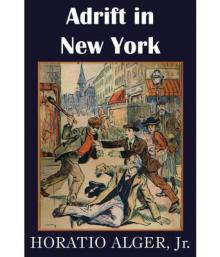 Adrift in New York: Tom and Florence Braving the World
Adrift in New York: Tom and Florence Braving the World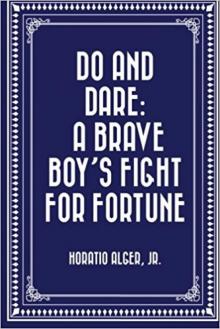 Do and Dare — a Brave Boy's Fight for Fortune
Do and Dare — a Brave Boy's Fight for Fortune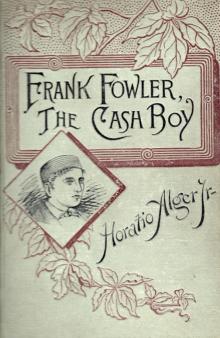 The Cash Boy
The Cash Boy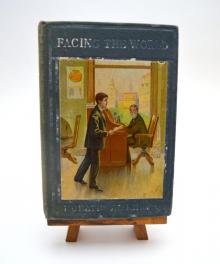 Facing the World
Facing the World The Young Explorer; Or, Claiming His Fortune
The Young Explorer; Or, Claiming His Fortune The Store Boy
The Store Boy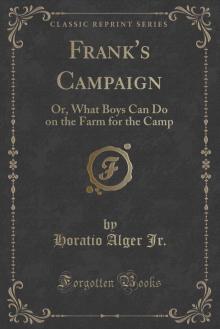 Frank's Campaign; Or, The Farm and the Camp
Frank's Campaign; Or, The Farm and the Camp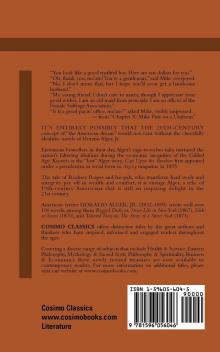 Cast Upon the Breakers
Cast Upon the Breakers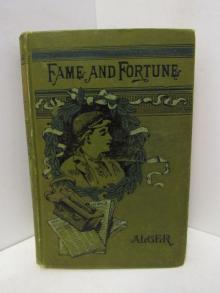 Fame and Fortune; or, The Progress of Richard Hunter
Fame and Fortune; or, The Progress of Richard Hunter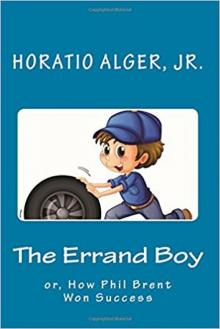 The Errand Boy; Or, How Phil Brent Won Success
The Errand Boy; Or, How Phil Brent Won Success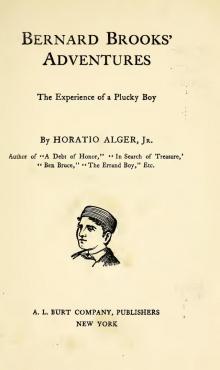 Bernard Brooks' Adventures: The Experience of a Plucky Boy
Bernard Brooks' Adventures: The Experience of a Plucky Boy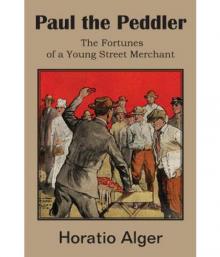 Paul the Peddler; Or, The Fortunes of a Young Street Merchant
Paul the Peddler; Or, The Fortunes of a Young Street Merchant Brave and Bold; Or, The Fortunes of Robert Rushton
Brave and Bold; Or, The Fortunes of Robert Rushton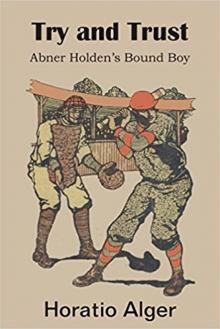 Try and Trust; Or, Abner Holden's Bound Boy
Try and Trust; Or, Abner Holden's Bound Boy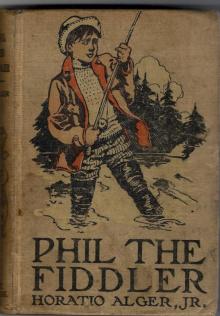 Phil, the Fiddler
Phil, the Fiddler In A New World; or, Among The Gold Fields Of Australia
In A New World; or, Among The Gold Fields Of Australia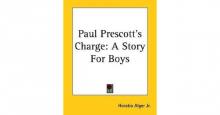 Paul Prescott's Charge
Paul Prescott's Charge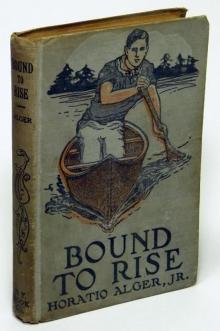 Joe's Luck; Or, Always Wide Awake
Joe's Luck; Or, Always Wide Awake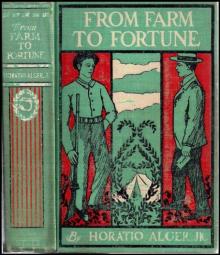 From Farm to Fortune; or, Nat Nason's Strange Experience
From Farm to Fortune; or, Nat Nason's Strange Experience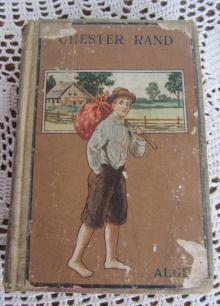 Chester Rand; or, The New Path to Fortune
Chester Rand; or, The New Path to Fortune Driven from Home; Or, Carl Crawford's Experience
Driven from Home; Or, Carl Crawford's Experience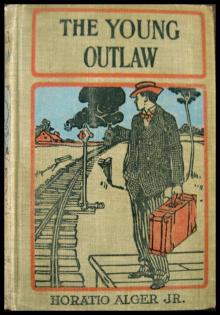 The Young Outlaw; or, Adrift in the Streets
The Young Outlaw; or, Adrift in the Streets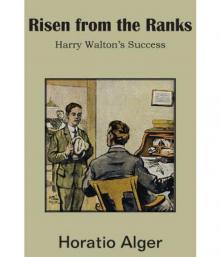 Risen from the Ranks; Or, Harry Walton's Success
Risen from the Ranks; Or, Harry Walton's Success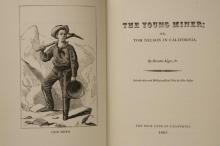 The Young Miner; Or, Tom Nelson in California
The Young Miner; Or, Tom Nelson in California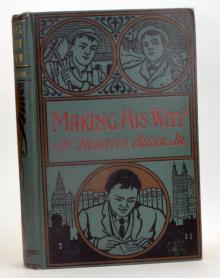 Making His Way; Or, Frank Courtney's Struggle Upward
Making His Way; Or, Frank Courtney's Struggle Upward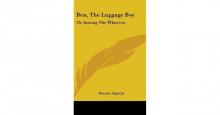 Ben, the Luggage Boy; Or, Among the Wharves
Ben, the Luggage Boy; Or, Among the Wharves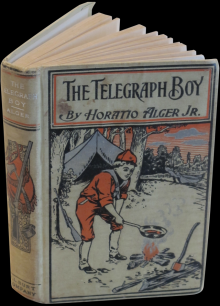 The Telegraph Boy
The Telegraph Boy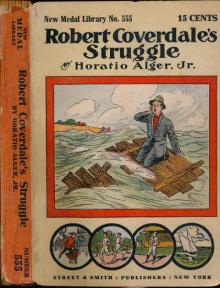 Robert Coverdale's Struggle; Or, on the Wave of Success
Robert Coverdale's Struggle; Or, on the Wave of Success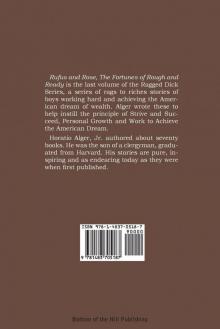 Rufus and Rose; Or, The Fortunes of Rough and Ready
Rufus and Rose; Or, The Fortunes of Rough and Ready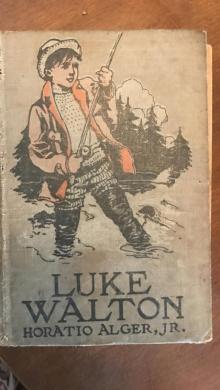 Luke Walton
Luke Walton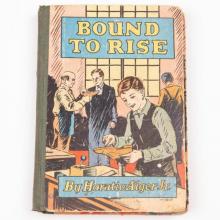 Mark Mason's Victory: The Trials and Triumphs of a Telegraph Boy
Mark Mason's Victory: The Trials and Triumphs of a Telegraph Boy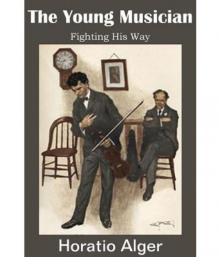 The Young Musician; Or, Fighting His Way
The Young Musician; Or, Fighting His Way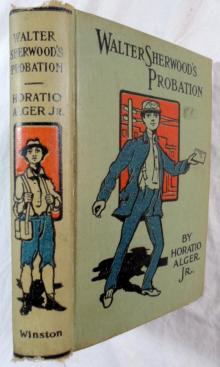 Walter Sherwood's Probation
Walter Sherwood's Probation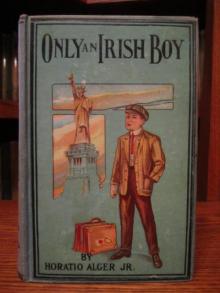 Only an Irish Boy; Or, Andy Burke's Fortunes
Only an Irish Boy; Or, Andy Burke's Fortunes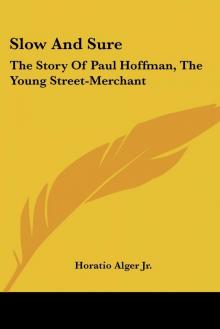 Slow and Sure: The Story of Paul Hoffman the Young Street-Merchant
Slow and Sure: The Story of Paul Hoffman the Young Street-Merchant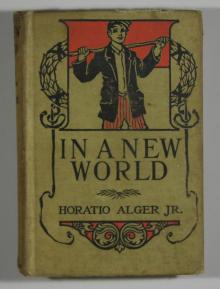 Herbert Carter's Legacy; Or, the Inventor's Son
Herbert Carter's Legacy; Or, the Inventor's Son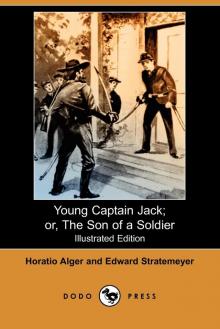 Young Captain Jack; Or, The Son of a Soldier
Young Captain Jack; Or, The Son of a Soldier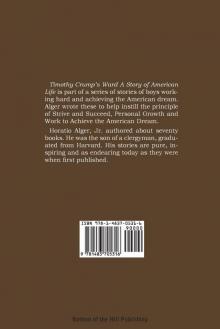 Timothy Crump's Ward: A Story of American Life
Timothy Crump's Ward: A Story of American Life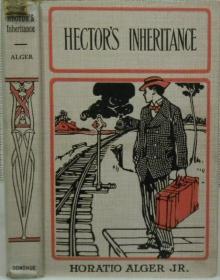 Hector's Inheritance, Or, the Boys of Smith Institute
Hector's Inheritance, Or, the Boys of Smith Institute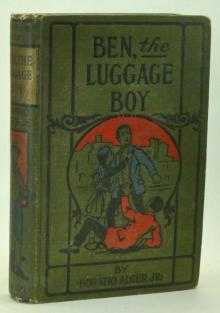 Ben's Nugget; Or, A Boy's Search For Fortune
Ben's Nugget; Or, A Boy's Search For Fortune